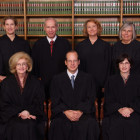
Laws Sending Kids to Adult Court at Issue in New Jersey High Court
|
Tuesday, the New Jersey Supreme Court considered the constitutionality of the state’s so-called juvenile waiver laws – a series of rulings that effectively allow county persecutors, and not state judges, to determine whether juvenile cases should be moved to adult courts. Currently, minors as young as 16 accused of a violent offense, such as homicide or aggravated assault, can be transferred to adult court under the state’s waiver laws, according to New Jersey’s The Record. More than 20 local and national organizations, including the American Civil Liberties Union and the state’s Public Defender’s Office, have challenged New Jersey’s juvenile waiver laws, with many arguing that the regulations – which give judges limited ability to deny prosecutor requests for moving cases to adult courts – are unconstitutional. As the laws are written today, unless a defense attorney can demonstrate a prosecutor’s request that a juvenile be transferred to an adult court is a “patent abuse of discretion,” the presiding juvenile court judge is bound by law to grant the request, The Record reports. Tuesday’s hearing centers on a 2009 Middlesex County mugging involving several juveniles – a case in which the trial judge challenged the prosecuting attorney’s request to move the case to adult court.


